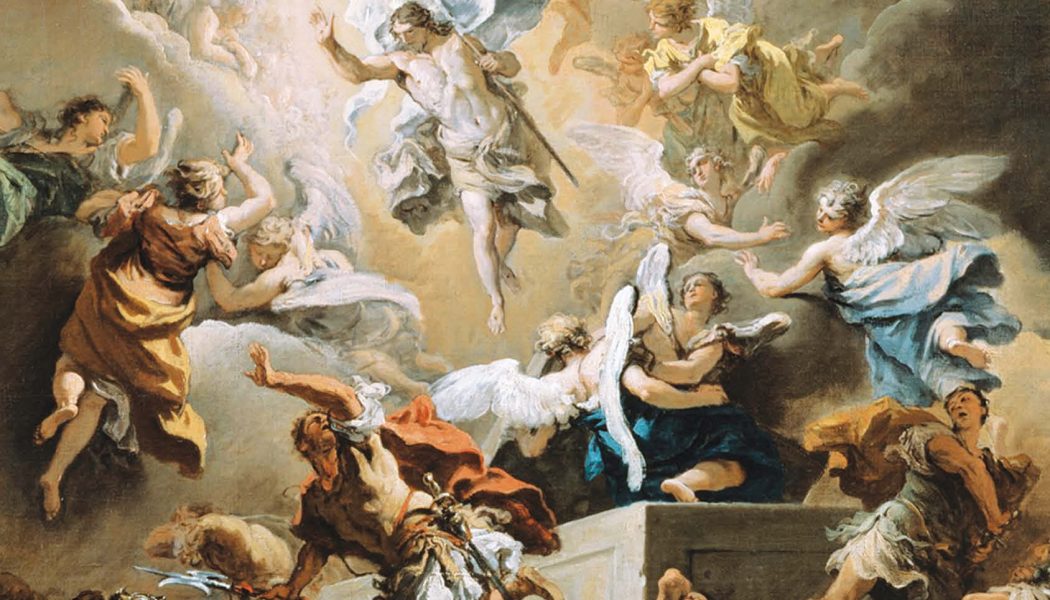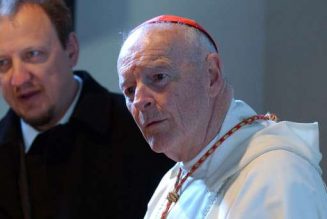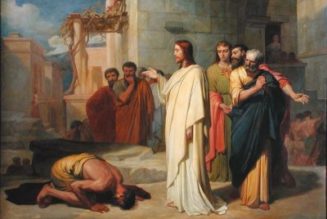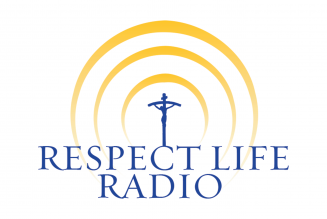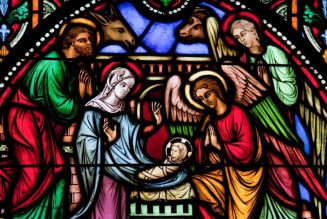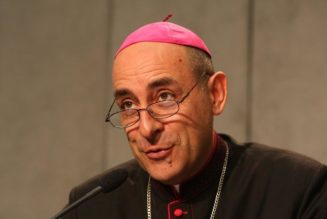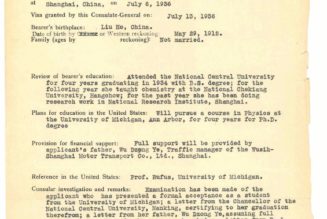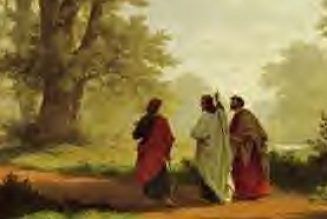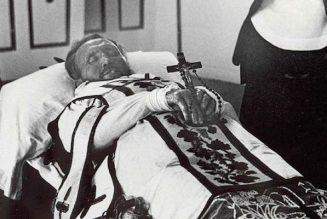Matthias Stom (fl. 1615-1649), “The Supper at Emmaus”
Scott Hahn: What Does the Bible Tell Us About Coronavirus and God’s Punishment?
Listen to this enlightening interview with Dr. Scott Hahn on Register Radio:
Other ways to listen to Register Radio:
- Download MP3: To download the MP3 file, right-click on the play button above and select ‘Save/Download Audio As…’
- EWTN Radio: Listen to Register Radio every Saturday at 7 p.m. Eastern, and Sunday at 11 a.m. Eastern, on EWTN Radio.
- Android/Google Home: Say, “Hey Google, play Register Radio”
- Amazon Alexa: Tell Alexa to “Play Register Radio podcast”
- iPhone: Tell Siri to “Play Register Radio podcast,” or search for “Register Radio” in Apple’s podcasts app.
- NCRegister.com: Visit the Register Radio home page at NCRegister.com.
Transcript
[00:13] JEANETTE DEMELO: In these difficult days, high rates of sickness and death tolls from coronavirus are constantly in the headlines. It is powerfully helpful for Catholics to remember the authentic Christian meaning of death and the resurrection of the body. Our Catholic faith can give us hope as we face our mortality, but too often we’ve lost sight of what our Church teaches about dying.
This week on Register Radio, we talk to Dr. Scott Hahn about his new book, Hope to Die. I’m Jeanette DeMelo, editor in chief of the National Catholic Register. I’m joined by my co-host, Matthew Bunson.
We’re all working from home. We’ve been cut off from the sacraments, and it’s really been a serious challenge for me and for many, many Catholics that I’ve heard from and read about. But the time has also been an important opportunity to reflect on our faith, and I have seen in my own family, my extended family, a renewal of faith and a greater interest in the sacraments.
Now what it has also brought to the forefront is death — and with death, we should also be considering the resurrection. Dr. Scott Hahn’s new book, co-authored with Emily Stimpson Chapman, who is a Register contributor, looks at the Christian understanding of death and the resurrection, and I think it comes at precisely the right time.
Now, Dr. Hahn is no stranger to our audience. He has been a longtime professor at Franciscan University of Steubenville. He’s the founder and president of the St. Paul Center. He’s been married to Kimberly Hahn for 40 years, and they have six kids, 19 grandchildren and two kids in the seminary — two young men in the seminary — one about to be ordained a deacon.
Dr. Hahn’s work includes his bestselling title, Rome Sweet Home, The Lamb’s Supper and Hail Holy Queen. And of course, this most recent title is Hope to Die: The Christian Meaning of Death and the Resurrection of the Body. Like many of his bestselling books, this one is an apologetic for Catholic teaching, and it teaches us Catholics first and foremost about what the Scripture and the early Church Fathers teach about our own faith.
Welcome, Dr. Hahn, after that very long intro, but welcome.
[02:41] SCOTT HAHN: It’s great to be back with you tonight — and also with you, Matthew.
[02:45] JEANETTE DEMELO: So let’s talk first about this very difficult moment. I hate that I keep having to reference coronavirus, but we’ve been in this for two months and ongoing, this weird moment, and it’s just it’s the reality we all have to talk about.
You can offer us something very interesting as a Scripture scholar. What does Scripture tell us about plagues, and how should we respond to this current plague?
 [03:14] SCOTT HAHN: Well, when you look in Sacred Scripture, you certainly do find references to plagues and pestilences. But you also have it grounded in the revelation of the covenant that God established with his people, the nation of Israel. You find it especially in Leviticus 26 then again even more fully in Deuteronomy 28.
[03:14] SCOTT HAHN: Well, when you look in Sacred Scripture, you certainly do find references to plagues and pestilences. But you also have it grounded in the revelation of the covenant that God established with his people, the nation of Israel. You find it especially in Leviticus 26 then again even more fully in Deuteronomy 28.
And I think we have to make it least two clarifications, because when we think about the curses of the covenant that are described in Leviticus 26 and Deuteronomy 28, we really have to walk it back, because when we see the term curse in English, we really miss the point of the Hebrew and the Greek.
And so let me just explain that if a covenant is a family bond, then God is a Father. And if he sends plagues and pestilences and this sort of thing, he does so as a punishment — not to get back at his people, but to get his people back to himself, and to bring his people back to their senses as well, because it’s so easy to be seduced and deceived by the world and to break our covenant, sometimes explicitly and intentionally, other times inadvertently.
And so we have to understand that when these punishments come, again, they’re not God getting his vendetta. But rather it’s a kind of wake-up call to show us that things are not as they ought to be. And so this is one of the restorative devices that God uses.
Sometimes you have an alarm and you sleep through it, so you have to set a louder one. This is a pretty loud alarm, and I think if we understand it is coming from a God who is all-powerful and all-knowing, but also all-loving, then we can understand why it is that these sorts of things happen in the history of God’s people. It’s to strengthen our relationship with him, and with each other as well.
[05:07] JEANETTE DEMELO: Right. You know, Dr. Hahn, one would think that you wrote this book as a response. I mean, it’s so perfectly timed. As I said in that intro, it’s just perfectly timed for this moment. But that isn’t the case. You did not write this for this moment. Why did you feel that now was the appropriate time — now meaning before the coronavirus — now is the appropriate time for this kind of apologetic?
[05:31] SCOTT HAHN: Well, you know, ever since I wrote Rome Sweet Home with my wife, Kimberly, almost 30 years ago, and then again, The Lamb’s Supper at the turn of the millennium in 1999, I have been tracing what I found in Scripture, most especially in the Holy Eucharist — which is, as we know, the real presence of Christ, body, blood, soul and divinity. It’s the same body that Christ had in the Upper Room on Holy Thursday. It’s the same body that hung on the Cross there at Calvary on Good Friday. It’s also the same body that was buried.
But what I’ve really come to see more clearly, and I have also recognized the need to emphasize more emphatically, is that the body of Christ that we receive in Holy Eucharist is the resurrected body. And this is why, for example, in Luke 24, after spending hours walking with Clopas and his companion, he only discloses his identity and his risen body when he takes, he blesses, he breaks and he gives them that bread. And the breaking of the Eucharistic bread is the unveiling of the mystery of Christ’s body as it is resurrected, as it is ascended.
It’s not just a resuscitated corpse. It’s not just a miracle. It’s not just the fulfillment of the Scriptures (“in accordance with the Scripture, he was raised on the third day”). It really is the divinization of the humanity that he has taken from us, and then he returns it to us.
And so when we recognize that, we can say, wow — our hope is not just to win the lottery. It isn’t just the World Series. It isn’t just pie in the sky. This is something that is grounded — “Christ in me, the hope of glory,” as Paul declares in Colossians. And it’s also the reason why he can live each and every day of his life and say, “For me, to live is Christ, but to die is gain.” And this is more than the Super Bowl. I mean, this is what is eternal life, but it is something that we don’t have to wait for. It is something that we receive here and now.
And okay, yeah, I had my reasons, I had my timing. I was hoping that this book would come out just in time for Easter of 2020. And so I worked on it almost all of 2019. And I sent it off at the end of the year, and I began editing page proofs in January into February and then finishing up … this is Leap Year, so on Feb. 29 I’m finishing up, and realizing what is descending upon us — a pandemic like none of us has had. So I called the publisher and said, “Stop the presses. I want to rewrite this last chapter because everything is coming into a clearer focus.” But I’m seeing now more clearly than ever that there is a divine purpose, that there is a divine timing. And so I rewrote the last chapter in view of this greater clarity. And so I think that it will add a lot to the experience of readers.
[08:24] MATTHEW BUNSON: In fact, you make an important point that all of this reminds you of 9/11 — which would be, I think, the event that is uppermost in people’s minds when we’re thinking of great disasters of certainly living memory. What were some of those lessons for you?
[08:38] SCOTT HAHN: Well, you know what, as I look at the coronavirus in this pandemic, I’m reminded of 9/11, and I remember going through it with my family, almost the entire day, with the TV on and explaining to my younger kids, and my daughter at that time was just barely a teenager. And so at the end of the day, we gathered for family prayer and she looked at me earnestly and said, “Dad, are we going to die?” I hesitated, then I looked at her and I said, “Well, yeah, definitely, but probably not today.”
And she wasn’t all that relieved. And so I went on to remind her of what I think she already knew, and that is, the mortality rate is 100%. None of us are going to get out of here alive. But I said our hope is founded in the fact that the immortality rate is also 100%, because everybody who ever lived on this earth still lives in one state or another — in a state of grace, destined for glory, or in a state of disgrace, destined for gloom, as it were.
And so what matters the most is not necessarily whether we’re going to die today or tomorrow or the next day, but how we live in the light of this hope.
And she looked at me, she’s like, “Thanks, Dad.” I realized that was probably more for me than for her. We said our prayers and I said the blessing over my kids. And then I went down to the chapel in the basement of our parish and spent an hour before our Lord. And when I went there, I was alone. I was grateful because I was so heavy-hearted. And as I knelt down and I looked up at the monstrance, I just poured out my heart. I’m like, “Lord, why did you allow this to happen? This is the single darkest day in my whole life, and practically everybody else’s as well.”
In a moment of silence, I looked and I realized that there in the monstrance was a gentle but very strong reminder that it really wasn’t the darkest day in human history. The darkest day was the day after he instituted the Eucharist. There, on Good Friday, at Calvary, when the human race performed the single greatest crime against the living God of all time. In that very same hour, as we’re crucifying the beloved Son of God, God was redeeming the entire human race. So the very people who were executing Jesus were being redeemed by the Lord.
This goes beyond anything my mom used to say when she would say to the kids, “When life gives you lemons, make lemonade.” It was clearly proof that what Jesus is reminding us, and St. Paul promises — that God’s strength is made perfect in our weakness, that only when we lose our life will we find it. And this is more than “the darkest hour is before the dawn.” And so I suddenly began to sense that when things happen in human history that look just like pure darkness, the light of the gospel shines more brightly, and we’re realizing more than ever that the medicine of his mercy is what he’s waking us up to.
The reality of wrath, okay. And the need to repent, for sure. But the fact that God wants us more than we want him, that he loves us more than we love ourselves and our loved ones, that he’s capable of forgiving us, that he’s desiring to reconcile us to him and to each other. I mean, this is what is on the heart of a Father, and especially if we believe in God the Father Almighty, all-loving and all-knowing.
And so this for me is what we have to wake up to and realize that these are more than just 12 articles that we recite every time we say the Apostles’ Creed. These are more like gems in a cluster. And I like to point to the resurrection of Jesus as sort of being the Hope Diamond, but not something that we have to wait to see at the end of time, because it’s precisely the resurrected body of Christ that we receive in Holy Communion.
And I also reference this beloved daughter of mine. (I’ve got five sons and one daughter — I always say, one rose and five thorns.) But she and I were just talking, like, three weeks ago, and she’s now a mother with four kids and all of that. It’s just wonderful to see her maturing in so many wonderful ways.
But she said to me, “Dad, I think I’m waking up to the fact that I have taken the Holy Sacrifice of the Mass so for granted so much of my life. I have never hungered for Holy Communion as much as I am now.”
And I said, “Well, first of all, you couldn’t bless a dad more than you just did.” But I said, also, “You’re echoing the hearts of probably hundreds of thousands of Catholics.” And I’m reminded of what Joni Mitchell sang way back in the seventies with “Big Yellow Taxi” — “You don’t know what you’ve got till it’s gone.”
[13:19] JEANETTE DEMELO: That’s right.
[13:20] SCOTT HAHN: And so to go through Lent — wow. I mean, this was the “lent-iest” Lent of all time. But, you know, the Easter Vigil, the Triduum, all of Easter Week. It’s like the Mystical Body of Christ longing to come out of the tomb — feels like we’re almost a state of suspended animation. And yet I believe that when we do come out, we’re going to come out not only more grateful and more aware, but also more hope-filled than ever before. If we allow our Lord to wake us up to the mysteries of faith, we’re going to see that this hope of ours … in the Eucharist, but also in the resurrection … and this is ultimately how Jesus plans to fulfill that promise he gave the disciples one year before all of this happened to him, when he said, “He who eats my flesh and drinks my blood, I will raise him up on the last day.”
When we receive Holy Communion next, we’re receiving the resurrected body of Christ. Now, when we eat ordinary food like burgers or fries and salads, we assimilate that to our bodies. But when we receive Holy Communion, he assimilates our mortal bodies to his risen and glorified body and prepares us to enter into that glory.
And this isn’t like rocket science. It isn’t calculus. It really is more than just talking points, more than just lining up Catholic doctrine. We begin to blow off the dust of the doctrines that we’ve heard all of our lives and realize these things are more valuable, more precious, than rubies, emeralds, sapphires — and, yes, even diamonds. I was the child of a jeweler. My father was one of the great jewelry designers, as artists go, and so I realize I grew up taking precious gems for granted. He wasn’t wealthy, but he was brilliant as an artist and he would show me the rings that he designed, and he didn’t make the precious stones, but when he assembled them in a cluster, people just want to wear that kind of ring.
We’ve got something supernaturally more abundant than any jewels on this earth. And I am convinced that the new evangelization may well go to the next level if what that means is re-evangelizing those who have been de-Christianized, those who are baptized but have strayed from the truth of the Catholic faith. I think that we can become the means by which others not only come back to the faith, but come back to hope and discovering God’s love like never before. We know about faith, hope and love, but I’m convinced that of those three virtues, hope is the thing we need. It’s sort of like the stepsister. It’s the Cinderella of the three theological virtues, and we need it now more than ever before.
[15:58] JEANETTE DEMELO: I want to follow up on that thought, but let’s take a quick break. We’ve been talking to Dr. Scott Hahn about his new book, Hope to Die. This is Register Radio and there will be more of this discussion with Dr. Hahn when we return.
[16:12] BREAK
[17:57] JEANETTE DEMELO: Welcome back. We’ve been talking to Dr. Scott Hahn about his book, Hope to Die. It can be ordered from the St. Paul Center (stpaulcenter.com).
He just was talking about how faith, hope and love are virtues that we always need to be focused on in our Catholic life, in our Christian life — but particularly, about hope itself.
And Dr. Hahn, you reminded me in this book of something I read several years ago. This was Spe Salvi, the encyclical by Pope Benedict XVI. It was profound for me — very, very impactful. And I remember reading about how, for those early Christians, the Good News was not just informative — it wasn’t just information that they absorbed in their minds — but it was something performative. It was something that absolutely changed their lives. And these people were given a hope because before then, they couldn’t hope for the resurrection of the dead. All they could see was the brutal realities they lived with.
And so you … this is the very thing that you are talking about in this book is this new hope and that as Christians … you just said it, as Catholics … this death, the idea of death, the reality of death (and the resurrection, of course) should be a means of evangelization. How do we get there? How do we as Catholics use this concept of death and resurrection to evangelize?
[19:37] SCOTT HAHN: That’s a great question, Jeanette. I think the most important thing we can do is to take God at his word and to recognize that his word is not just describing what reality is. It is, as you say, performative.
When God said, “Let there be light,” there was nothing but darkness. But by saying it, he did it. And that is what happens when he gives us his word, and that word becomes flesh and dwells among us.
Up until that, death was always something dreadful. Death was always the loss of life. Until Jesus died. When he died, he didn’t lose his life, he made his life a gift of love. And not just for us back then and there, but for us here and now. And he gives it to us so much that “Christ in us, the hope of glory” is such that when we receive Holy Communion, when we are baptized and united to his Body, we get a life that is not only out of this world, but it’s also inside of it. But it’s not just human — it’s also divine.
And this is where we can see how the New Testament builds on the Old. “I didn’t come to abolish the Law and the Prophets but to fulfill.” And so when you go back to the beginning and you can see what God is doing with our first parents, breathing into Adam’s nostrils the breath of life. So his first breath is not just oxygen, like the animals. It’s God’s own breath. It’s the Holy Spirit. That endowed him with a divine life.
Well, that’s the key, because just 10 verses later, in Genesis 2:17, God invites man to eat from all of the trees except for one. And then he warns them, “The day you eat of it, you will surely die.”
Well, they ate and they didn’t drop dead, but they did commit a mortal sin — what 1 John 5:17 calls the “sin unto death” (thanatos), the same word used in Genesis 2:17. And when you commit a mortal sin like our first parents, you snuff out the life of God in your soul, which isn’t less of a death, but far more than a bullet to the brain. And so the life that they had was lost when they committed original sin.
Now we contract original sin — we don’t commit it. And that doesn’t leave us depraved at birth, like I used to believe as a Protestant, but it leaves us utterly deprived of the divine life that God gave our first parents. And so when our parents transmit life to us, it’s human, it’s natural, but it’s devoid of the divine and the supernatural.
So in baptism, Paul says in Romans 6, we enter into Jesus’ death and resurrection. But we are resurrected to divine life. We are resurrected not metaphorically, but actually, truly — even more than Lazarus was after four days, because he just got his physical body back as a human. We get divine life back.
And so what we have is a clear perception that in the Catholic gospel we have a life that is not just human, natural, for this earth. It is divine; it is supernatural and eternal. And so the loss of life that’s human is something dreadful. But the loss of divine life is not less, but more, dreadful. This life that is more valuable is also more vulnerable.
And so this time of pandemic wakes us up to the fact that we cannot keep a life that is finite and transitory. But we can and should do all that we can to keep this life that is divine and eternal.
Let me just finish this part with a quote from my favorite source on this. In the book, I quote from St. Julian of Toledo, a sixth-century bishop, who says, “Everyone fears the death of the flesh, but few fear the death of the soul. Destined to die, humanity struggles to avoid dying, and yet, destined to eternal life, we do not labor to avoid sinning. When we struggle to avoid death, we labor in vain. In fact, the most we can do is to defer death; we can’t avoid it. If rather we refrain from sinning, our toil would cease and we would live forever. If only we could incite people, ourselves included, to be lovers of eternal life, at least as much as they’re lovers of this life that passes away!”
And I think that’s what’s really happening inside of us now. We thank God for the gift of life. We explain to him in prayer, we don’t want to die. But what we recognize is that even when we do die, we don’t have to lose our lives. Like Christ, we can make our life a gift of love and give it back to him in exchange for what he’s given to us in Christ.
[23:53] JEANETTE DEMELO: You know, you … we have just about four minutes, three minutes left. It’s about time to wrap up. But there’s something you say in the book about being “more dead.” And it reminded me of The Princess Bride — “No, he’s just mostly dead.” And of course, that’s talking … you’re talking about being dead in sin, and what an important reminder for us right now, because most of us can’t receive the sacraments the way we often do. Most of us are not faced immediately with the reality of death, but we are always faced with the death through sin.
Dr. Hahn, in these just … two minutes that you have to conclude … what can we do? What should our response be to this pending death or the death of sin? Practically speaking.
[24:46] SCOTT HAHN: Well, you know, since you quoted The Princess Bride, I’ll quote it again, because we think we know what life and death mean, but I don’t think that word means what you think it means, you know?
And I’m reminded of another family favorite film, and that is The Sixth Sense, where the little child Cole finally admits to the child psychologist (played by Bruce Willis) Malcolm — you know, “Here’s my secret. I see dead people.”
“In your dreams?”
“No, dead people.”
“Like in graves?”
“No, walking around like regular people. They don’t see each other. They don’t know they’re dead. They only see what they want to see.”
In effect, our culture has this zombie craze. And I think what our Lord wants to whisper is, “I see dead people. They don’t know they’re dead. They only see what they want to see. All the time. They’re everywhere. But you can be the means by which they could be raised from the dead” — by sharing the gospel, by giving them the faith and by inviting them to receive these sacraments, which are not rituals that we do for God so much as they are what God does for us to give us what we need, to make up for what we lack, to resurrect us to a life that is truly eternal, divine and supernatural. It’s almost too good to be true, except it’s the truth of the gospel.
And so I apologize. I can’t say any more in two minutes, but I think that’s enough.
[26:05] JEANETTE DEMELO: That’s wonderful and I am so appreciative of this book. It really is a perfect timing, and I guess we can thank God for that.
I invite our listeners to go to stpaulcenter.com to buy this book, and also to check out the May 10 print edition of the Register, which includes a commentary by Dr. Hahn called “Theology of the Resurrected Body,” and it will be posted online around May 18 — the birthday, the 100th birthday, of John Paul II.
Dr. Hahn, thank you so much for being with us.
[26:38] SCOTT HAHN: Oh, Jeanette, it’s been a joy. And thank you, Matt, also, for joining us.
[26:42] JEANETTE DEMELO: Remember — for more news, analysis and commentary, check out the National Catholic Register online (ncregister.com). Thanks, as always, for joining us here on Register Radio on EWTN. For Matthew Bunson and our producer Jeff Burson, I’m Jeanette DeMelo. Until next week — God bless you.
[27:03] OUTRO
